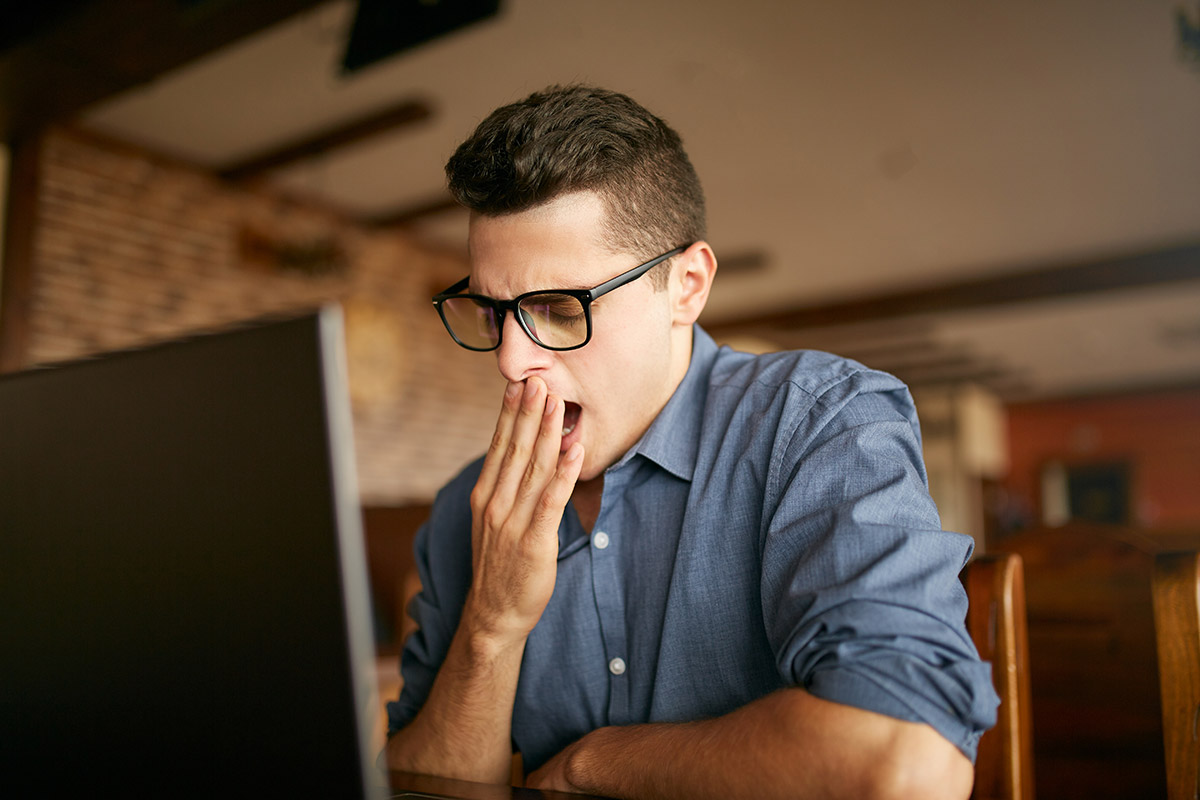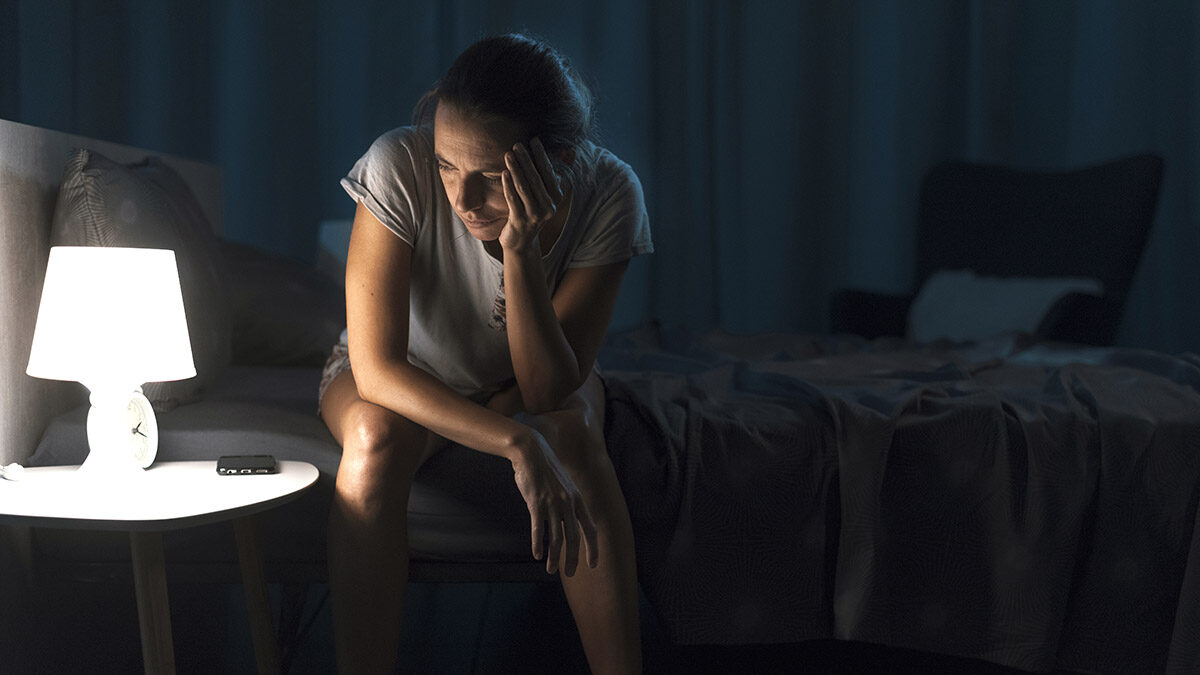Yawning at Work? This Is Why You Might Be Feeling Tired All the Time

If you’re a busy person who’s balancing a career and a social life, there’s a good chance you probably feel tired a lot of the time. It’s not unusual to rely on an extra shot of espresso to get through a morning meeting or power through a cardio class.
But even though being tired feels as normal a part of the human experience as eating or breathing, there comes a point where feeling exhausted all the time might not be healthy. In fact, it could be your body trying to tell you something important.
According to the NHS, feeling constantly low on energy is so common that it has its own acronym, ‘TATT’, or ‘tired all the time’, and a new YouGov survey has revealed that 13% of us exist in a state of constant exhaustion.
So what’s driving this long-term tiredness? We asked experts to explain some of the most common causes of lingering fatigue and the steps you can take to feel energised.

Your diet is out of whack
If you’re struggling to keep your eyes open at your desk, your diet might be to blame – especially if you rely on sugary snacks to power you through an afternoon work project.
People who have high-sugar diets tend to experience an initial, feel-good energy boost after eating sugary foods, followed by a tell-tale crash and fatigue. This is because the sugar in the bloodstream is utilised by the body’s organs, particularly the brain, which thrives off glucose from sugary or carbohydrate-rich foods.
The body’s response to high-sugar foods is to secrete large amounts of insulin into the body, to drive the sugar out of the bloodstream. This process can cause blood sugar levels to plummet, which leads to symptoms of fatigue and poor concentration.
To maintain stable blood sugar levels, try switching out an afternoon chocolate pick-me-up for nuts, plain popcorn or hummus with vegetables.
You’re low on a specific nutrient
Nutrient deficiencies can also lead you to feel exhausted on a daily basis, even if you’re getting more than seven hours of good sleep each night.
“Deficiencies in certain nutrients — such as iron, magnesium, folate, potassium and vitamins B12 and D — can be a real driver for unexplained tiredness,” says Abbas Kanani, a pharmacist at Chemist Click online pharmacy.
If you’re concerned, your doctor can test for nutrient deficiencies and suggest appropriate treatment options. The good news? Fatigue related to a deficiency in one or more nutrients typically improves once your nutrient levels normalise.

You’re not sleeping enough
It might seem obvious but sleep is crucial for recovery both physically and mentally. If you have poor quality sleep over a period of time it can seriously affect your mood, causing fatigue and lack of motivation.
Around a third of the UK population is estimated to suffer from insomnia according to The Sleep Council, and adults should aim for between 7 to 9 hours of quality sleep per night.
“Stress can lead to difficulty falling asleep, staying asleep, or achieving restful sleep. Sleep is crucial for recharging your body and mind. When you’re not getting adequate sleep due to stress, you’re more likely to experience tiredness during the day,” says
If you’re struggling to get enough rest, try practising good sleep hygiene behaviours including maintaining a regular bedtime, avoiding screens in the evenings, journaling your thoughts and sleeping in a clutter-free environment. You could also try Form’s ZZZZs (£19 for 30 capsules), a gentle nootropic supplement that supports regenerative sleep.
You’re doing too much high-intensity exercise
Believe it or not, but overtraining can lead to insomnia. High-intensity exercise without sufficient time to recover can lead to physical and mental fatigue. If your muscles aren’t given time to rest after exercise, it can reduce mobility and lower mood, so it’s important to factor in regular rest days and gentle sessions.
Exercise also releases feel-good endorphins which are the body’s response to physical stress – they help to relieve pain, reduce stress and improve mood.
While they’re generally a positive thing for us, intensive exercise during the three-hour period leading up to sleep can negatively impact sleep, because these hormones can increase your heart rate, body temperature, and adrenaline levels, making it difficult to wind down. If you’re struggling to sleep, try switching your evening classes for early morning training sessions instead.
You’re not exercising enough
That said, skipping out on regular movement can have the same effect, making you feel tired during the day. “Regular physical activity has numerous benefits for overall health and well-being, including its impact on energy levels,” says Kanani. “Exercise improves cardiovascular fitness, which means your heart becomes more efficient at pumping blood and delivering oxygen to your muscles and tissues. When you’re not regularly active, your cardiovascular system may become less efficient, leading to decreased oxygen delivery and potentially causing feelings of tiredness.
“Exercise has also been shown to release endorphins, which are natural ‘feel-good’ chemicals that can improve mood and reduce feelings of stress and anxiety. A lack of exercise may contribute to mood disturbances that can indirectly lead to feelings of tiredness and fatigue.”
High-intensity physical activity can also decrease the risk of excessive weight gain, which makes a person less likely to experience symptoms of obstructive sleep apnea – a sleep disorder in which breathing repeatedly stops and starts.
To combat the energy lull, make sure you aim for the NHS-recommended 150 minutes of moderate-intensity activity per week and, if you live locally, try walking to the studio to maximise the benefits of being out in the sun.

You’re drinking too much coffee or alcohol
It’s hard to resist a cold beer or iced coffee on a hot day, but your drinking habits might be silently sabotaging your sleep.
“Drinking too much caffeine and alcohol are factors that can contribute to a person feeling tired,” says Kanani. “This is because both have been linked to poor quality sleep.”
You’ve got an underlying health condition
Sometimes tiredness is a sign of serious underlying illnesses like an underactive thyroid gland, anaemia, chronic liver or kidney disease or some types of cancers.
That said, tiredness is very common and there is usually a simple lifestyle change that can help to boost your energy levels – so it’s important not to panic. If your tiredness lasts for more than two weeks, despite making an effort to reduce stress, eat healthily, reduce caffeine, reduce screen time and get good sleep, then Kanani says it’s time to see a doctor.
A GP can examine you and undertake some simple investigations like blood tests. From here, they can reassure you and give you advice regarding the best treatment going forward should they pick up any concerns.


















